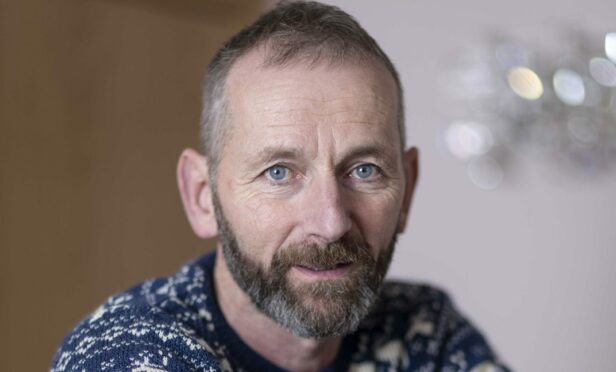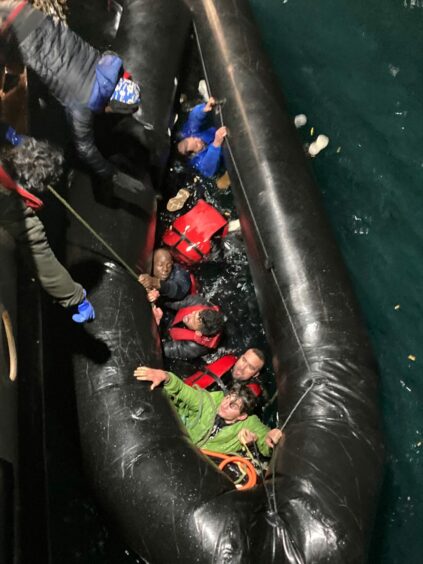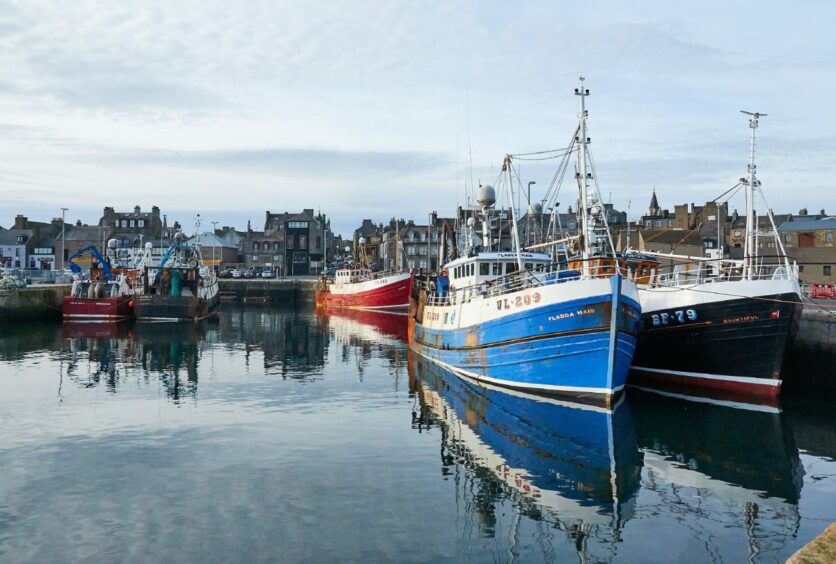A Fraserburgh skipper has described how his crew helped save the lives of more than 40 migrants as their dinghy began to sink in the freezing English Channel.
Raymond Strachan, skipper of scallop vessel Arcturus, can still vividly remember the night three weeks ago.
Dozens of migrants got into trouble as their tiny boat began to sink in the perilous waters, including an Afghan boy whose family was murdered by the Taliban.
“When people’s lives are in peril you have to save them. You cannot leave people in water,” Mr Strachan said.
Tragically, four of them could not be saved after their tiny boat started taking in water on December 14.
An estimated 45,000 people made the crossing last year, despite the dangers. The tragedy last month came after another in November 2021 when at least 27 migrants died when a dinghy sank while heading for the UK.
‘I could hear people screaming’
Mr Strachan was alerted by a crewman at 2.30am.
He told The Sunday Post: “The sea was calm, but there was an eerie haze on the water. The first people we rescued were pulled out of the water. They had swum towards us.
“We tied a boarding ladder to the side and they climbed up themselves. We had 16 on board but then we lost sight of the inflatable dinghy. It was pitch dark. I could hear people screaming.”
He steered the Arcturus towards the sound and managed to get alongside the dinghy.
“It was chaotic,” he said. “They were pulling themselves up over the top of the fishing gear. They were standing on top of each other to get to safety.
“Two people died inside that boat and I saw another man dying. I could tell he was suffering from cold water shock, I’d seen it before.
“I told the crew to get him, but he didn’t have the strength to climb up to where we could reach him. There were more than 40 people trying to make that crossing in an inflatable dinghy designed for about 12.
“Some were only wearing jeans and a T-shirt and no life jacket. The floor of the dinghy had ripped because it was overloaded and was letting water in. It collapsed and folded in on itself.
‘His family were killed by the Taliban’
“One of the youngest we picked up was an Afghan boy. He was the first I spoke to because he looked so young. I asked how old he was and he said 12. I took off his wet jacket and life jacket and told him to get down below and get into a warm shower. We made sure he was warm, dry and safe. Another two kids from Afghanistan, 12 and 13, were also rescued by my crew.”
The skipper, who was instructed to take the survivors to Dover, said a few days later, a police officer called him with a message from one of the 12-year-old boys rescued by his crew.
“He said he wanted to thank us for saving his life because that night he thought he was going to die. He said he fled Afghanistan because all his family were killed by the Taliban.
“I was quite emotional to hear this had happened to a young boy. I cannot imagine being 12 and being in that water. When I was that age, I was in the comfort of my own home, looked after by my family, I was making go-carts out of old crates, not being fished out of the sea.
“Who knows, he might go on to study here, work hard and in 15 years’ time, he might be the doctor who saves my life?”
Migrants grateful to be rescued
Mr Strachan is a father of three whose youngest child is just three years older than the boy he rescued.
That night his crew, assisted by another fishing boat and RNLI lifeboats and helicopters spotlighting the scene, lowered ropes to drag 39 migrants, including eight children, to safety.
He remembered how his Indian crewman Naveen Singh pulled someone from the water who was coincidentally from his home city of Delhi.
Mr Strachan said: “As Naveen hauled him out he was begging, ‘Please don’t let me go’. He was so grateful to be rescued, but to be rescued from the English Channel by another Indian who happens to be from the same city? You couldn’t make it up.
“It would be like me rescuing someone from Fraserburgh in the Indian Ocean.”
It is thought at least 43 people were on board the flimsy and heavily overloaded craft that collapsed and folded in on itself. Reports suggest each had paid people smugglers £5,000 to make the crossing.
The UK Government has insisted new measures aimed at curbing the number of small boats attempting to make the crossing are primarily intended to drive the smuggling gangs out of business.
Ministers, who have faced criticism for failing to slow the numbers of migrants arriving and for failing to put systems in place to improve the asylum process, have been accused of inflaming tensions by supporting hardline policies such as the removal of asylum seekers to Rwanda while applications are processed.
‘I am a fisherman with nine lives’
Mr Strachan is the last in a long family line of fishermen dating back more than a century, and qualified as a captain at just 24. In his 38 years in the industry, his own life has been in peril on a number of occasions.
The granddad-of-two says he has the support of his family – wife Louise, 48, who runs Fraserburgh’s Harbour Cafe, and children Shari-Anne, 33, Nathan, 29 and George, 15, none of whom, to his relief, want to follow him on to the deck.
He has survived a sinking, rogue waves, and the heartache of losing a crewman. “I have been very lucky,” he said. “I am a fisherman with nine lives.”
In September 1998 he was “pair trawling” on board the Fraserburgh-registered Karisma with another vessel in the Viking Bank, 160 miles north east of the port when the wooden boat took on water and started sinking.
He and the four other crew jumped into a life raft before being picked up by another boat 30 minutes later and taken to Bergen in Norway.
He remembered: “It was horrible to see your boat sink and lifebuoys, nets and people’s clothes floating about on the water. The boat is the only thing between you and the sea. But I wasn’t scared. Your survival instinct and adrenalin kick in. It was 24 years ago. I blank out the dangers.”
Mr Strachan went back to sea the following week.
‘I will never forget that day’
But in March 2003 while skippering the Phoenix he was caught in a violent force-11 storm – one below hurricane force on the Beaufort scale.
“We had dodged bad weather before but we got caught out 180 miles north east of Fraserburgh,” he said. “The waves were about 45ft in height and winds up to 70mph. I was in the wheelhouse at 6pm, the boat went up on the crest, then went down in the trough, and I saw this massive freak wave.
“The wall of water hit us and the whole boat shuddered. The glass smashed and I was up to my knees in seawater with little fires everywhere from the electrics.”
He was able to contact the other trawler by VHF radio and was helped back to Peterhead harbour. One person was injured but all survived.
Following the tragic April 2009 Super Puma crash, Mr Strachan was asked by the coastguard to help search for survivors, and later bodies.
“I was fishing in the area,” he said. “I heard a loud bang and the pilot swear on the VHF distress channel. It was tragic. I will never forget that day.”
More heartache was to follow. The Maggie Ann was fishing in Cardigan Bay, Wales, in 2009 when Romanian crewman Stefan Tamas fell overboard without his life jacket.
His body was never found. Mr Strachan said: “He drifted away and by the time we got him he had cold water shock and we lost him. That affected me for a long time. Even yet I think about him.”




Conversation